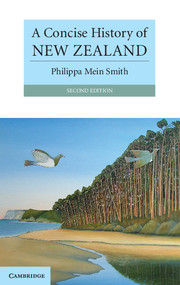Book contents
- Frontmatter
- Contents
- Illustrations
- Acknowledgements
- Preface
- 1 Waka across a watery world
- 2 Beachcrossers 1769–1839
- 3 Claiming the land 1840–1860
- 4 Remoter Australasia 1861–1890
- 5 Managing globalisation 1891–1913
- 6 ‘All flesh is as grass’ 1914–1929
- 7 Making New Zealand 1930–1949
- 8 Golden weather 1950–1972
- 9 Latest experiments 1973–1996
- 10 Treaty revival 1973–1999
- 11 Shaky ground
- Glossary Of maori words
- Timeline
- Sources of Quotations
- Guide to Further Reading
- Index
8 - Golden weather 1950–1972
Published online by Cambridge University Press: 05 October 2013
- Frontmatter
- Contents
- Illustrations
- Acknowledgements
- Preface
- 1 Waka across a watery world
- 2 Beachcrossers 1769–1839
- 3 Claiming the land 1840–1860
- 4 Remoter Australasia 1861–1890
- 5 Managing globalisation 1891–1913
- 6 ‘All flesh is as grass’ 1914–1929
- 7 Making New Zealand 1930–1949
- 8 Golden weather 1950–1972
- 9 Latest experiments 1973–1996
- 10 Treaty revival 1973–1999
- 11 Shaky ground
- Glossary Of maori words
- Timeline
- Sources of Quotations
- Guide to Further Reading
- Index
Summary
Wartime controls only ended in 1950, allowing New Zealanders to look forward to an era of post-war growth and change. The 1950s and 1960s are often recalled as a ‘golden age’. In many respects they were, for the baby boomers (born from 1945 to 1961) who enjoyed a childhood unburdened by depression and war, and for the parents responsible for their upbringing. Broadly, however, the internal dynamics of the Pacific region were in flux. Bruce Mason captured the mood in The End of the Golden Weather, his solo dramatic performance about a summer in a boy's childhood. At adolescence, he explained:
This strange and magic light – this golden weather – begins to change and, for the first time, some of the troubling weathers of a man's soul are revealed to him;…he becomes aware of the thousand changing visages of time, touched with confusion and bewilderment, menaced by terrible depths and enigmas of experience he has never known before.
So it was for New Zealanders in the 1950s and 1960s. The unsettling of settler society had already begun, first for Maori, then for future Pacific Island migrants and lastly for Pakeha.
These were years of full employment for men – until 1967 – in an economy that increasingly needed married women in the workforce. The significant gap in life expectancy between Maori and Pakeha narrowed rapidly. A new round of culture contact began with a major movement of Maori to the cities. A generation gap opened between baby boomers and their parents, who wanted their children to better themselves through expanding educational opportunities. Sustained growth made possible the consumer society and accompanying changes in etiquette and social norms, from hats and gloves to miniskirts and informality. Communications were transformed, linking New Zealand more strongly to the world. This was an era of social change and new interdependencies.
- Type
- Chapter
- Information
- A Concise History of New Zealand , pp. 183 - 209Publisher: Cambridge University PressPrint publication year: 2011



